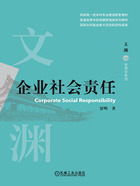
学习链接
[1]AGUDELO M A L, JÓHANNSDÓTTIR L, DAVÍDSDÓTTIR B, 2019. A literature review of the history and evolution of corporate social responsibility[J].International Journal of Corporate Social Responsibility, 4(1):1-23.
[2]AGUILERA R V, RUPP D E, WILLIAMS C A, et al., 2007. Putting the S back in corporate social responsibility: a multilevel theory of social change in organizations[J].Academy of Management Review, 32(3):836-863.
[3]AGUINIS H, 2011. Organizational responsibility: doing good and doing well[J].In S. Zedeck (Ed.),APA Handbook of Industrial and Organizational Psychology (Vol. 3): 855-879. Washington, DC:American Psychological Association.
[4]AGUINIS H, GLAVAS A, 2012. What we know and don't know about corporate social responsibility:a review and research agenda[J].Journal of Management, 38(4):932-968.
[5]BARNEY J B, 1991. Firm resources and sustained competitive advantage[J].Journal of Management, 17(1):99-120.
[6]CARROLL A B, 1991. The pyramid of corporate social responsibility: toward the moral management of organizational stakeholders[J].Business Horizons, 34(4):39-48.
[7]JIA M, XIANG Y, ZHANG Z, 2018. Indirect reciprocity and corporate philanthropic giving: how visiting officials influence investment in privately owned Chinese firms[J].Journal of Management Studies, 56(2):372-407.
[8]LUO X R, WANG D, ZHANG J, 2017. Whose call to answer:institutional complexity and firms' CSR reporting[J].Academy of Management Journal, 60(1):321-344.
[9]PENROSE E T, 1959. The theory of the growth of the firm[M].Oxford: Oxford University Press.
[10]PFEFFER J, SALANCIK G R, 1978. The external control of organizations: a resource dependence perspective[M].New York:Harper&Row.
[11]RUPP D E, 2011. An employee-centered model of organizational justice and social responsibility[J].Organizational Psychology Review, 1(1):72-94.
[12]RUPP D E, WILLIAMS C A, AGUILERA R V, 2011. Increasing corporate social responsibility through stakeholder value internalization (and the catalyzing effect of new governance): an application of organizational justice, self-determination, and social influence theories[J].Managerial Ethics Routledge, 87-106.
[13]SPRINKLE G B, MAINES L A, 2010. The benefits and costs of corporate social responsibility[J].Business Horizons, 53(5):445-453.
[14]WANG H, TONG L, TAKEUCHI R, et al., 2016. Corporate social responsibility: an overview and new research directions[J].Academy of Management Journal, 59(2):534-544.
[15]WERNERFELTB.A resource-based view of the firm[J].Strategic Management Journal, 1984, 5(2):171-180.
[16]XIANG Y, JIA M, ZHANG Z, 2022. Hiding in the crowd: government dependence on firms, management costs of political legitimacy, and modest imitation[J].Journal of Business Ethics, 176(4):629-646.
[17]贾明,2022.“一带一路”沿线中国企业海外社会责任[M].北京:科学出版社.
[18]林万祥,2008.成本会计研究[M].北京:机械工业出版社.
[19]刘爱军,钟尉,2016.商业伦理学[M].北京:机械工业出版社.
[20]吴小节,杨书燕,汪秀琼,2015.资源依赖理论在组织管理研究中的应用现状评估:基于111种经济管理类学术期刊的文献计量分析[J].管理学报,12(01):61-71.
[21]张璐,王岩,苏敬勤,等,2021.资源基础理论:发展脉络、知识框架与展望[J/OL].南开管理评论,1-22.
[22]赵庚科,郭立宏,2009.基于重复博弈的区域产业集群内多企业间合作激励机制研究[J].管理评论,21(08):122-128.